

Fifth of crimes involved domestic abuse in first England and Wales lockdown. One in five offences recorded by police during and immediately after the first national lockdown in England and Wales involved domestic abuse, figures have revealed.
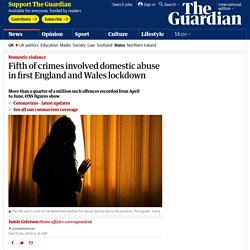
Police recorded more than a quarter of a million offences flagged as domestic abuse-related from April to June, the Office for National Statistics (ONS) said. The 259,324 offences represent a rise of 7% from the same period in 2019, and an 18% increase from two years ago. The ONS said the number of offences flagged as involving domestic abuse had been increasing over recent years so it could not be determined whether the rise was due directly to the pandemic.
In April, May and June roughly a fifth (21%, 20% and 19%) of offences recorded by police were flagged as domestic abuse-related. The number rose each month, with the biggest rise between April and May (9%). The easing of lockdown measures at this time may have made it safer for victims to seek help, the ONS said. The gender wars of household chores: a feminist comic. 'My father said I should be looking after the cows': the first female Tuareg guitarist. Les Filles de Illighadad are in their dressing room, listening to music on their phones and scrolling through social media apps.
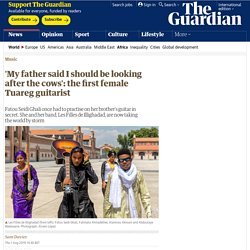
Fatou Seidi Ghali, the band’s lead guitarist and singer, leans in to show me a Snapchat she has just received from a friend: in a hilly desert, a white-robed man is riding a horse at full speed. He tries to stand up in the saddle and falls off into a plume of sand. Fatou looks up at me, laughing. The group are from a small village called Illighadad in the Tuareg region of the Sahara in western Niger. While the region has produced some celebrated guitarists, acts such as Bombino, Mdou Moctar and Tinariwen’s Ibrahim Ag Alhabib, Fatou is the first ever Tuareg woman to play guitar professionally. She started the band in 2016 with her cousin Alamnou Akrouni, who plays percussion and sings. Another brother, Ahmoudou, introduced Fatou to the instrument, albeit inadvertently, when he brought one home from Libya. How important is music to the Tuareg? Gender pay gap: has anything changed in your workplace since last year?
Since changes were made to the Equality Act in April 2017, companies in England, Wales and Scotland with more than 250 employees are required to report their gender pay gap figures.
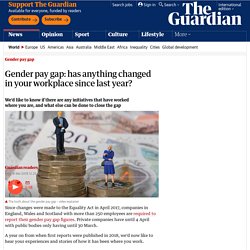
Private companies have until 4 April with public bodies only having until 30 March. Gender equality is not a ‘women’s issue’ – it’s good for men too. Men have always played critical roles in the women’s movement.

From John Stuart Mill to Fredrick Douglass, male allies have long supported the struggle for gender equality. And today there are plenty of men who are proud feminists – just ask Andy Murray, who hired and championed a female coach, Amélie Mauresmo; or Ryan Gosling, who has become something of a feminist icon. But there is still a long way to go, and we’ll only get there by drawing more men into the conversation. Despite all the progress made, men still dominate positions of power. And, as a string of recent harassment scandals has shown, the behaviour of some men has had profound effects on women’s careers, their success and their lives.
Gender equality is not a ‘women’s issue’ – it’s good for men too. The Guardian view on violence against women: deeds not words are required. The creation of the new offence of coercive or controlling domestic abuse in 2015, combined with provisions in the current government’s domestic abuse bill including the creation of a specialist commissioner, ought to mean that the situation for survivors across the UK is improving.

The new tools are important ones for police, prosecutors and campaigners. Big firms lying about female and minority directors, says top business chief. The new chair of one of the UK’s most influential business groups has accused Britain’s biggest companies of lying when they say they cannot find enough female or ethnic minority directors.
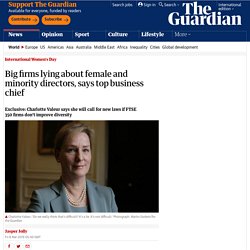
Charlotte Valeur, who joined the Institute of Directors (IoD) in September, said she would start calling for new laws next year to force firms to improve their diversity if FTSE 350 companies failed to make faster progress. Speaking to the Guardian ahead of International Women’s Day, Valeur criticised large listed companies for not achieving diversity targets. Only six countries in the world give women and men equal legal work rights.
Lack of sanctions 'makes a mockery' of gender pay gap reports. Inaccurate figures and a lack of sanctions risk making a “mockery” of the gender pay gap reporting system, critics have warned following an in-depth Guardian analysis of submissions.
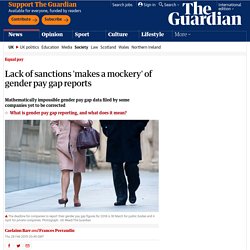
Amid concerns that a lack of transparency and inaccurate reporting is undermining efforts to address pay inequality, mathematically impossible gender pay gap data filed by companies for last year has yet to be corrected. And with less than a month to go before this year’s reporting deadline, the Equalities and Human Rights Commission (EHRC) admitted that, despite those errors, no companies have yet been fined for failing to comply with legislation. The deadline for companies to report their gender pay gap figures for 2018 is 30 March for public bodies and 4 April for private companies. Upskirting made criminal offence from April. Why so many young women don't call themselves feminist. Image copyright Reuters In recent years, feminist movements have attracted significant attention in Europe and North America.
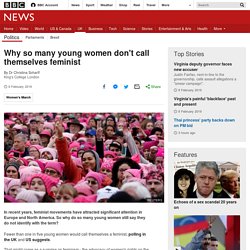
So why do so many young women still say they do not identify with the term? Fewer than one in five young women would call themselves a feminist, polling in the UK and US suggests. That might come as a surprise as feminism - the advocacy of women's rights on the grounds of equality of the sexes - has been in the spotlight lately. A day after the inauguration of US President Donald Trump, millions around the world joined the 2017 Women's March. Jordan Peterson: “There was plenty of motivation to take me out. It just didn... Germany adopts third gender identity for intersex people. A war on women is raging in the UK – the femicide statistics prove it. The latest census on femicide – women killed by men – has shown that during 2017, a staggering 139 women in the UK died as a result of male violence.
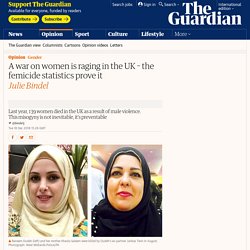
But nobody joined the dots between these cases except for feminists campaigning against male violence towards women. Despite there being an obvious link between the misogynistic culture under which brutal – and often fatal – male violence occurs, the UK government has never made the connection that these women die because men’s violence towards women and girls is a global pandemic. The resistance to legally making misogyny a hate crime (currently under review) is partly down to the fact that it is such a huge everyday reality that it seems impossible to enforce. The search for my inner ‘hero’: a modern masculinity retreat. Despite spending 62 years as a man, I have never quite worked out what the possession of my defining Y chromosome implies.

I doubt, in truth, that much of the damn thing survives anyway. I was brought up in a generation when nearly all the parenting was done by mothers and I have now helped to bring up four daughters as well as having been through the crucible of two marriages. 'No world to leave our children’: progress on women's rights still lags, shows study. Progress on women’s rights has been far slower than expected across the world as a report shows underage marriage rates have barely come down this decade, while dozens of nations still legally prioritise men. Forty-one countries recognise only a man to be the head of the household; 27 countries still require that women obey their husbands by law; and 24 countries require women to have the permission of their husband or a legal guardian (such as a brother or father) in order to work.
One in six girls worldwide is still married before turning 18, despite the introduction of legislation increasing the legal age of marriage in more countries than ever, according to a new global gender index. The numbers have decreased so slowly since 2012 that global advisers warn it could take a century before child marriage is eradicated for good. The Guardian view on the Gender Recognition Act: where rights collide.
Since 2004 trans people in the UK have been able to legally change their gender with a gender recognition certificate. The Gender Recognition Act became the first law in the world allowing someone to change gender without surgery. Since then countries including Ireland and Denmark have passed laws that allow people to “self-declare” their gender, rather than seeking approval from a panel of experts. Last year the Scottish government held a consultation with a view to following suit. This Friday the UK government’s consultation on the same issue comes to an end. Why do we dress boys in clothes that are grey, joyless and dull?
When I asked my eight-year-old son what he would like to wear to a forthcoming wedding, his response was clear and immediate: “A red suit with white spots, a matching hat and gold shoes.” This seemed fair enough to me. Who in their right mind would not want to wear such a fabulous outfit? We set off for our local shopping centre in high spirits. And yet, within an hour of hitting the high street, depression had set in. There is a unique kind of misery to be found in an eight- to-14-year-old boys’ clothing section: rail upon rail of sludge green, grey and – my son’s personal nemesis – navy blue. In an entire morning, we found not one item of clothing that was interesting, not one that expressed even the tiniest iota of individuality or creativity. Why do we dress boys in clothes that are grey, joyless and dull? How Serena Williams won the world’s worst role: representing all of modern wo...
What female celebrity should I be looking towards to explain my life to me these days? Everyone, apparently Excellent question, Everyone! There is always one woman who becomes the prism through which all concerns about modern women are refracted, whether it’s about sexuality, motherhood, social media or eating. I call her the Ur-Woman. Doctor Who star Jodie Whittaker hopes role will inspire young girls. BBC reduces gender pay gap to 8.4% The BBC has reduced the gender pay gap for all its staff to 8.4%, as it prepares to reveal the salaries of its biggest on-screen stars. Top-paid men outstrip women by 4 to 1, shock figures reveal. Ministers shelve pledge on women’s safety. The government has been accused of failing women who have been subjected to sexual, psychological and violent abuse after it emerged that a clutch of new laws and codes to protect them have been shelved. Among the proposed measures were laws to stop rape victims from being cross-examined in court about their previous sexual history, and tougher action on domestic violence.
Both have now been sidelined. “While the government dithers and makes excuses, women are being abused by repeat offenders who should be on a register, victims are being cross-examined in court by their own stalkers, and rape victims are facing the torment of their own sexual history being used as evidence against their credibility,” said Liz Saville Roberts, a Plaid Cymru MP and the party’s justice spokesperson. Boris Johnson’s white privilege: imagine he was a black woman. To the outside world, Boris Johnson has become a faithful representation of Britain’s current foreign policy. 20,000 children were asked to draw their... - BBC Family & Education News. Golden Globes 2018: Three Billboards wins four but Oprah steals the night.
Three Billboards Outside Ebbing, Missouri took home four awards at the 75th annual Golden Globes but it was the #MeToo movement that led conversation in a politically charged ceremony. The small-town drama won best motion picture (drama) as well as best screenplay, best supporting actor and best actress (drama) for Frances McDormand, who spoke about the importance of women speaking out against sexual predators.
'Being a mum held me back at work' There's proof: electing women radically improves life for mothers and families. UK transgender rights row intensifies as book fair is cancelled. How India is battling sexual violence: gender classes for Delhi rickshaw drivers. In the dim classroom, the low lights form a halo around Achyuta Dyansamantra as he strides back and forth before a whiteboard, intoning into the microphone like a preacher. “If you stare at a woman for more than 14 seconds, that can land you in jail,” he tells the audience. Singing to women in public or passing lewd remarks is also banned, he says.
“Whether you agree with it or not, the law is the law.” About 100 faces stare back, many scribbling notes, some toying with their phones. I'm angry. You're angry. All women are angry. But will that be enough? Princess, love, girl – when is a term of endearment not welcome? 'You'll never work again': women tell how sexual harassment broke their careers. The 'masculine mystique' – why men can't ditch the baggage of being a bloke. Gender pay gap widening for women in their 20s, data shows. Women and men are speaking out about abuse – is this the end of the patriarchy? What connects rape in war, domestic violence and sexual harassment? Patriarchy. The fall of Harvey Weinstein should be a moment to rethink masculinity. Men or mice: is masculinity in crisis?
BBC gender pay gap: male staff earn 9% more than female colleagues. End of Saudi women driving ban reflects deep changes in society. Number of working mothers in England rises by a million in 20 years. Revealed: Britain's most powerful elite is 97% white. Women are still not in the driving seat in Saudi Arabia. 'A feeble no may mean yes': Indian court overturns rape conviction. The F-word: feminism must be reclaimed by today’s teens – they’re our future. School trousers or skirts for all: ‘Children should experience equality’ Why the battle against sexist school shoes is a fight worth having.